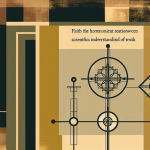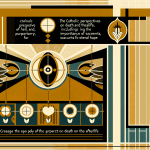Why Is the Vatican Important?
The Vatican, officially known as Vatican City State, is the smallest independent state in the world, both in area and population. However, its significance far surpasses its size. Nestled within the heart of Rome, the Vatican serves as the spiritual and administrative center of the Roman Catholic Church. This blog post will delve into the multifaceted importance of the Vatican, exploring its religious, historical, cultural, and political significance.
The Spiritual Significance of the Vatican
One of the primary reasons why the Vatican is crucial is its role as the spiritual epicenter of the Roman Catholic Church. It is the residence of the Pope, the supreme leader of the Catholic faith. Millions of Catholics from around the globe look to the Vatican for guidance, inspiration, and spiritual leadership.
The Seat of Papal Authority
The Vatican is home to St. Peter’s Basilica, which is built over the tomb of Saint Peter – one of Jesus Christ’s apostles and a foundational figure in Christianity. This sacred space attracts millions of pilgrims and tourists annually. The Pope, as the Bishop of Rome, holds significant authority and is believed to be the spiritual successor to Saint Peter.
Pilgrimages and Religious Events
Throughout the year, the Vatican hosts several important religious events, including Christmas Mass, Easter celebrations, and canonization ceremonies. These events draw vast crowds and are broadcast worldwide, emphasizing the Vatican’s role as a global religious hub. The significance of these events underscores why the Vatican is important not just to Catholics but also to Christians and others seeking spiritual connection.
The Vatican’s Diplomatic Role
The Vatican engages in diplomacy, fostering relationships with other nations while promoting peace and humanitarian efforts. As an observer in the United Nations and other international organizations, the Holy See plays a vital part in global discussions about human rights, peace, and social justice issues. This diplomatic influence elevates the Vatican’s importance on a global scale.
Historical Importance of the Vatican
The historical significance of the Vatican is profound, marked by centuries of influence on Christianity and Western civilization.
The Origins of the Vatican
The history of the Vatican dates back to the early Christian church, establishing it as a cornerstone of Christian history. It transformed from a burial site for Christians into a powerful religious and political institution. This evolution reflects the rise of Christianity and its eventual acceptance and establishment as a dominant religion within the Roman empire.
The Renaissance and Beyond
During the Renaissance, the Vatican became a cultural and artistic beacon, commissioning renowned artists such as Michelangelo and Raphael. The Sistine Chapel, famous for its breathtaking ceiling painted by Michelangelo, is a testament to this period’s artistic influence and remains a significant tourist attraction.
Preservation of History
The Vatican houses an extensive collection of art and historical artifacts in the Vatican Museums, making it crucial for historical preservation. The archives hold documents that are invaluable for understanding European history and the evolution of Christianity. With millions of visitors each year, the Vatican continues to share its history with the world.
Cultural Significance of the Vatican
The Vatican’s cultural importance cannot be overstated. It is a massive contributor to global art, architecture, and music, influencing diverse fields.
Architectural Marvels
St. Peter’s Basilica is an architectural wonder of the Renaissance, symbolizing the power and prestige of the Catholic Church. Its dome, designed by Michelangelo, dominates the Roman skyline and is an iconic representation of the Vatican’s grandeur. The intricacies of Vatican architecture reflect centuries of craftsmanship, making it a vital part of cultural heritage.
Art and Literature
The Vatican has been a patron of the arts for centuries. The Vatican Museums boast masterpieces that span various artistic styles and epochs. Not only do these collections enrich global culture, but they also serve as a testament to Catholic faith, illustrating biblical narratives and church history through art.
Musical Heritage
The Vatican has a rich tradition of music, particularly through the Vatican’s own choir, the Sistine Chapel Choir. The blend of sacred music and liturgical celebration has shaped music in the Christian context, creating compositions still performed today. The Vatican’s influence on liturgical music highlights its role in promoting art and culture within the religious setting.
The Vatican’s Role in Modern Society
In today’s world, where religious and secular values often collide, the Vatican holds a unique place in global discussions.
Interfaith Dialogue
The Vatican actively engages in interfaith dialogue, promoting understanding and cooperation among different religions. This commitment to dialogue plays a crucial role in fostering peace and communal harmony in an increasingly divided world. The Vatican’s position as a neutral party allows it to mediate and facilitate discussions that can lead to cooperative actions for global welfare.
Addressing Global Issues
The Vatican addresses pressing global issues such as poverty, climate change, and human rights. Pope Francis, in particular, has fervently advocated for social justice and environmental protection, emphasizing the Church’s responsibility to care for creation. His encyclical “Laudato Si’” highlights the necessity of environmental stewardship, resonating with audiences beyond Catholicism.
Global Health and Humanitarian Efforts
Through various humanitarian initiatives, the Vatican works globally to combat issues such as poverty, disease, and injustice. The Vatican’s funding and support for health initiatives, especially during crises like the COVID-19 pandemic, demonstrate its commitment to humanitarian causes. This aspect of its importance reinforces the idea of a Church actively engaged in healing the world.
Conclusion
In summary, the Vatican is not just a religious institution; it is a significant entity that influences millions of lives across the globe. From its role as the spiritual leader of the Roman Catholic Church to its contributions to art, culture, and global diplomacy, the Vatican’s importance is undeniable. By understanding why the Vatican is important, we gain insight into the broader interplay of faith, history, culture, and contemporary global issues. The Vatican remains a fundamental part of the tapestry of human experience, embodying a bridge between ancient traditions and modern global challenges.




